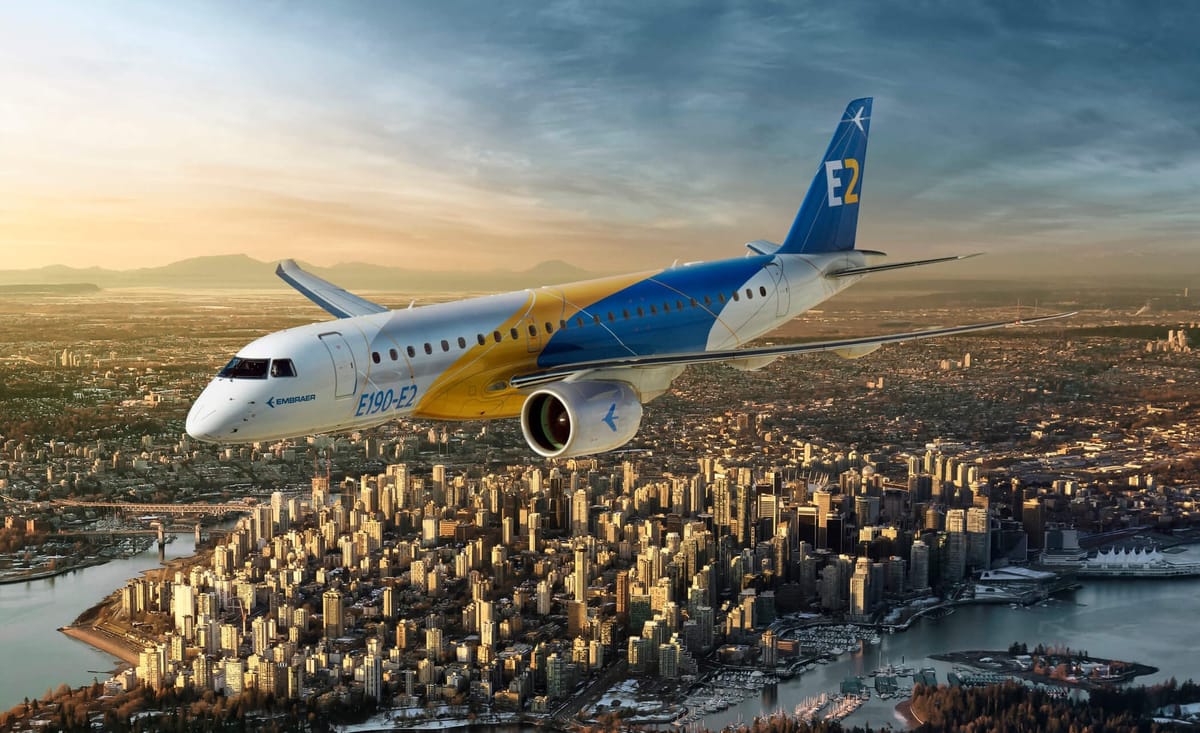Civil Aviation Authority of Singapore (CAAS) Certified Embraer E190-E2 and E195-E2 Types
The aviation industry has reached a significant milestone with the Civil Aviation Authority of Singapore (CAAS) granting type certification to Embraer's E190-E2 and E195-E2 jets.


Civil Aviation Authority of Singapore (CAAS) Certified Embraer E190-E2 and E195-E2 Types
Key Takeaways:
- The Embraer E190-E2 and E195-E2 aircraft have been awarded type certification by the Civil Aviation Authority of Singapore (CAAS).
- This certification underscores the aircrafts' status as the most fuel-efficient single-aisle jets in the world.
- The E2 series' advancements contribute significantly to sustainable aviation, offering economic and environmental benefits.
The aviation industry has reached a significant milestone with the Civil Aviation Authority of Singapore (CAAS) granting type certification to Embraer's E190-E2 and E195-E2 jets. This achievement not only marks a pivotal moment for Embraer but also for airlines seeking to enhance their fleets with the world's most fuel-efficient single-aisle aircraft. The certification process is a rigorous one, ensuring that new aircraft meet the highest safety and performance standards. Embraer's success in this area is a testament to its commitment to innovation and excellence in aviation technology.
The Certification Process: A Rigorous Journey to Approval
The journey to type certification is a comprehensive process that involves a series of stringent evaluations and testing. For the Embraer E190-E2 and E195-E2, this meant demonstrating compliance with numerous safety regulations and performance benchmarks. The CAAS, recognized for its meticulous standards, conducted thorough assessments of the aircraft's design, engineering, and flight capabilities. This certification is not only a nod to the aircraft's safety but also to its technological advancements that set new industry benchmarks.
Advertising
Embraer's E2 Series: Pioneering Fuel Efficiency
Embraer's E2 series has been making waves in the aviation industry with its impressive fuel efficiency. The E190-E2 and E195-E2, in particular, have been designed with state-of-the-art aerodynamics, new-generation materials, and advanced digital systems. These innovations have culminated in a significant reduction in fuel consumption, making these aircraft the most fuel-efficient single-aisle jets on the market. This efficiency is a crucial factor for airlines looking to reduce operational costs and minimize their environmental footprint.
Economic and Environmental Impacts of the E2 Jets
The economic benefits of the E190-E2 and E195-E2 are clear: lower fuel costs translate to improved profitability for airlines. However, the advantages extend beyond economics. The environmental impact of these aircraft is equally noteworthy. With reduced fuel consumption comes a decrease in carbon emissions, aligning with global efforts to combat climate change. The E2 series represents a step forward in sustainable aviation, offering a greener alternative for air travel without compromising on performance or comfort.
Advancements in Aerodynamics and Engine Technology
The E190-E2 and E195-E2's superior performance is largely due to advancements in aerodynamics and engine technology. The aircraft feature new high-aspect-ratio wings and geared turbofan engines, which contribute to their exceptional fuel efficiency. These technological improvements not only enhance the aircraft's operational efficiency but also provide a smoother, quieter flying experience for passengers. Embraer's commitment to innovation is evident in these design choices, which push the boundaries of what is possible in modern aviation.

Advertising
The Role of Digital Systems in Aircraft Performance
Digital systems play a pivotal role in the performance and safety of the E190-E2 and E195-E2. Embraer has integrated sophisticated avionics and flight management systems that optimize route efficiency and reduce pilot workload. These systems contribute to the aircraft's overall performance, ensuring that they operate at peak efficiency. The use of digital technology also enhances the reliability of the aircraft, providing airlines with greater operational flexibility and reduced maintenance requirements.
Meeting Global Safety Standards
Safety is paramount in aviation, and the E190-E2 and E195-E2 have met the highest global safety standards to receive type certification. Embraer has worked closely with regulatory authorities to ensure that every aspect of the aircraft adheres to stringent safety criteria. This includes rigorous testing of the aircraft's structural integrity, emergency systems, and overall resilience. The certification by CAAS is a clear indication that the E2 series meets, and in some cases exceeds, international safety requirements.
The Competitive Edge for Airlines
Airlines operating the E190-E2 and E195-E2 gain a competitive edge in the market. These aircraft offer cost savings through fuel efficiency and reduced maintenance, allowing airlines to offer competitive pricing while maintaining profitability. Additionally, the E2 jets' range and capacity make them ideal for both regional and longer routes, providing airlines with the flexibility to optimize their networks. The type certification by CAAS further enhances the marketability of these aircraft to airlines operating within and beyond Singapore.
Singapore's Aviation Landscape and the E2 Series
Singapore's aviation landscape is known for its innovation and efficiency, making it an ideal backdrop for the introduction of the E190-E2 and E195-E2. The CAAS's endorsement of these aircraft is significant, as it opens doors for Embraer to expand its presence in the Asia-Pacific region. Airlines in Singapore and the surrounding areas can now consider the E2 series as a viable option for fleet expansion or renewal, with the assurance of CAAS's rigorous certification process.
The Future of Sustainable Aviation with Embraer
Embraer's achievement with the E190-E2 and E195-E2 type certification is a step towards a more sustainable future in aviation. The company's focus on fuel efficiency and reduced emissions is in line with the industry's move towards greener practices. As airlines and regulatory bodies continue to prioritize sustainability, Embraer's E2 series stands out as a leader in environmentally responsible air travel, setting a precedent for future aircraft development.
Advertising
Summary
The type certification of Embraer's E190-E2 and E195-E2 by the Civil Aviation Authority of Singapore marks a significant advancement in the aviation industry. These aircraft are now recognized as the most fuel-efficient single-aisle jets globally, offering economic and environmental benefits that align with the future of sustainable aviation. With their cutting-edge aerodynamics, engine technology, and digital systems, the E2 series sets new standards for safety, performance, and efficiency. This certification not only validates Embraer's commitment to innovation but also provides airlines with a competitive edge in an increasingly eco-conscious market.
FAQ Section
Q1: What is type certification, and why is it important for new aircraft? A1: Type certification is a regulatory process that ensures new aircraft meet specific safety and performance standards set by aviation authorities. It is crucial because it verifies that the aircraft is safe for operation and complies with the regulations of the aviation industry.
Q2: How do the Embraer E190-E2 and E195-E2 contribute to sustainable aviation? A2: The Embraer E190-E2 and E195-E2 contribute to sustainable aviation by offering significant fuel efficiency, which leads to lower carbon emissions. Their advanced aerodynamics, engine technology, and digital systems optimize performance while minimizing environmental impact.
Q3: What advantages do airlines have by operating the E190-E2 and E195-E2? A3: Airlines operating the E190-E2 and E195-E2 benefit from lower operational costs due to fuel efficiency and reduced maintenance. They also gain a competitive edge with the ability to offer economical fares, operate on a variety of routes, and meet the growing demand for environmentally friendly travel options.



